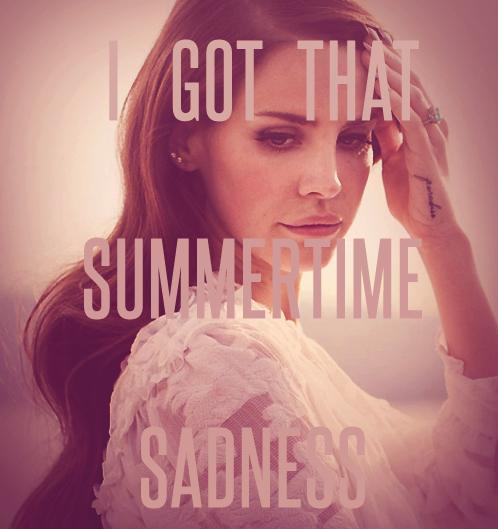I got that summertime sadness

I got that summertime sadness
Summer is often associated with feelings of joy, freedom, and relaxation. However, for some people, the season can bring about a sense of melancholy and sadness. Lana Del Rey captured this sentiment perfectly in her song "Summertime Sadness," where she sings about feeling blue during the supposedly carefree months of summer.The phrase "I got that summertime sadness" evokes a sense of longing and nostalgia for a time that is supposed to be filled with happiness and sunshine. It speaks to the idea that even in the midst of warm weather and fun activities, some people may still feel a sense of emptiness or sadness. This could be due to a variety of reasons, such as loneliness, unmet expectations, or unresolved emotions.
One possible explanation for summertime sadness is the pressure to have a perfect summer. With social media constantly bombarding us with images of people having the time of their lives on beach vacations or at music festivals, it's easy to feel like we're not measuring up. This can lead to feelings of inadequacy and FOMO (fear of missing out), which can contribute to a sense of sadness during the summer months.
Additionally, for some people, summer can be a reminder of past traumas or difficult experiences. The longer days and warmer weather may trigger memories of painful events, leading to a sense of unease or sadness. This can be especially challenging for those who struggle with mental health issues, as the change in routine and increased social expectations during the summer can exacerbate feelings of anxiety or depression.
Despite the prevalence of summertime sadness, it's important to remember that it's okay to not always feel happy during the summer. Emotions are complex and multifaceted, and it's normal to experience a range of feelings, even during a season that is typically associated with joy. By acknowledging and accepting our emotions, we can better understand and navigate our own mental health during the summer months.












 Friendship Quotes
Friendship Quotes Love Quotes
Love Quotes Life Quotes
Life Quotes Funny Quotes
Funny Quotes Motivational Quotes
Motivational Quotes Inspirational Quotes
Inspirational Quotes